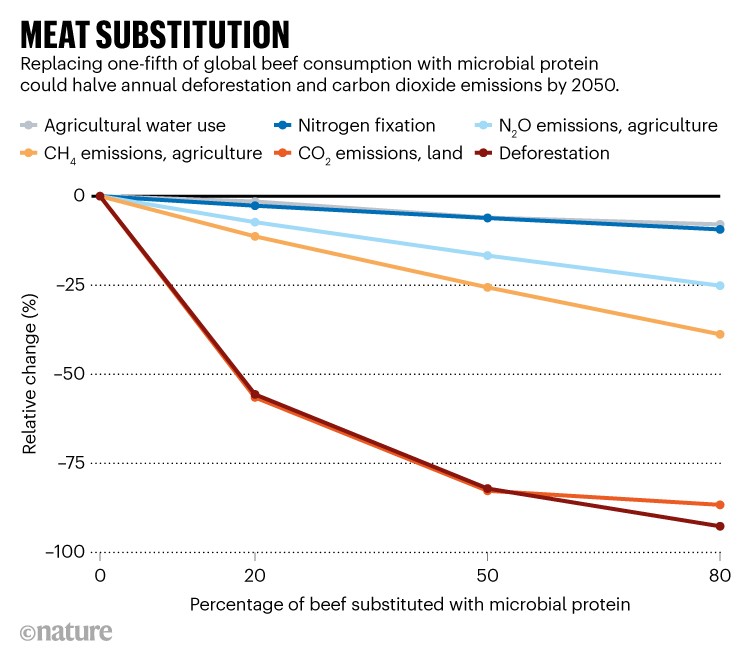Model suggests that switching to microbial ‘meat’ can cut carbon emissions.
Replacing just 20% of global beef consumption with a meat substitute within the next 30 years could halve deforestation and the carbon emissions associated with it, finds a modelling study.
The findings, published in Nature on 4 May1, come one month after the United Nations Intergovernmental Panel on Climate Change warned that humanity is nowhere near on track to limit global warming to 1.5 ºC above pre-industrial levels.
Beef farming is a top driver of deforestation worldwide, and cattle raised for beef are a major source of methane, a more potent greenhouse gas than carbon dioxide. Replacing beef with meat alternatives could reduce some of the food production’s environmental footprint, but it won’t solve the climate crisis, says study lead author Florian Humpenöder, a sustainability scientist at the Potsdam Institute for Climate Impact Research in Germany. “It should not be seen as a silver bullet,” he says.
Previous research has shown that replacing beef with a meatless alternative called mycoprotein can have beneficial effects on the environment. Produced in steel tanks by fermenting a soil-dwelling fungus with glucose and other nutrients as a food source, mycoprotein is a meat substitute that made its debut in the United Kingdom in the 1980s under the brand name Quorn and is now readily available in many countries.
Humpenöder and his colleagues are the first to estimate the environmental effects of partially replacing beef with mycoprotein over time, says Franziska Gaupp, who studies food systems at the Potsdam Institute for Climate Impact Research. Previous analyses didn’t take into account changes in population growth, food demand and other socio-economic factors.
The team used a mathematical model that considered increases in population growth, income and livestock demand between 2020 and 2050. Under a business-as-usual scenario, the global increase in beef consumption would require the expansion of pasture areas for grazing and of cropland for feed production, which would double the annual rate of deforestation globally. Methane emissions and agricultural water use would also increase.

Replacing 20% of the world’s per-capita beef consumption with mycoprotein by 2050 would reduce methane emissions by 11% and halve the annual deforestation and associated emissions, compared with the business-as-usual scenario (see ‘Meat substitution’). The mitigating effects on deforestation are so great because, under this scenario, global demand for beef does not increase, so there is no need to expand pasture areas or cropland for feeding cattle, Humpenöder says.
The beneficial effects on deforestation eventually plateau out. Swapping 50% of the beef consumed per person for mycoprotein would result in a more than 80% reduction in deforestation and carbon emissions, and replacing 80% of beef with mycoprotein would eliminate about 90% of forest loss.
All levels of substitution would result in relatively minor changes in agricultural water use, the researchers found. That’s because the water required to grow crops for feeding cattle would go towards growing other types of crop, including those for human consumption, Humpenöder says.
Global assessments such as the one carried out by Humpenöder’s team could help to highlight more-sustainable ways to produce food, says Hanna Tuomisto, who studies sustainable food systems at the University of Helsinki. Tuomisto notes that producing mycoprotein can require more electricity than producing beef, so researchers should consider the environmental impacts of producing extra power. She also points out that replacing beef with mycoprotein means that some by-products of cattle farming, such as leather and milk, might then be made in alternative ways that have environmental impacts.
“This study is a great start,” Gaupp says. Future research, she adds, should look at the environmental effects of replacing beef with other types of meat alternative, such as laboratory-grown meat or plant-based alternatives.
doi: https://doi.org/10.1038/d41586-022-01238-5




